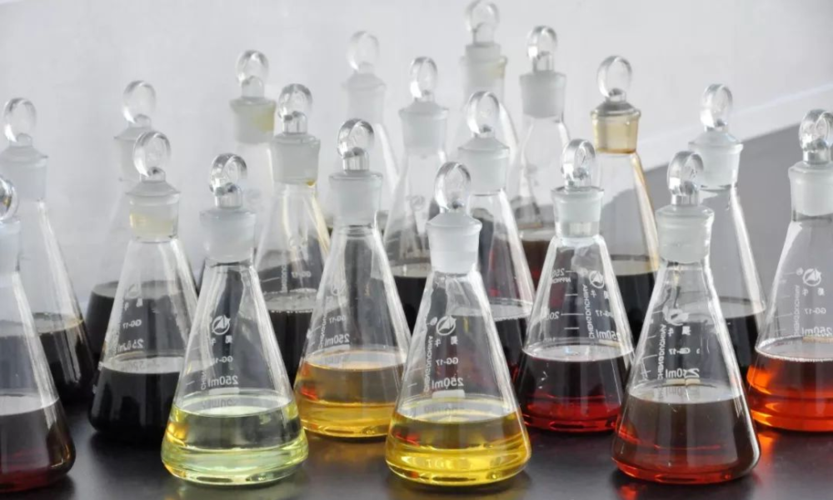With the development of hydraulic technology, the requirements for hydraulic fluid are getting higher and higher. The performance of base fluid itself is far from meeting the requirements of hydraulic system. It is necessary to improve the performance of base fluid by adding various additives. At present, almost all the fluids used in hydraulic systems contain additives with various functions. The additives of hydraulic fluid can be roughly divided into two categories: one is to improve the physical properties of the fluid, such as oily agent, tackifier, anti foaming agent and Pour Point Depressant. The other is additives to improve the chemical properties of oil, such as antioxidants, rust inhibitors, mold inhibitors, demulsifiers and metal passivators.

1. Oiliness Additive Oily agent is a kind of substance with strong polarity. Under low temperature and pressure, it can adsorb with metal surface to form a firm adsorption film, prevent metal from direct contact, improve oil film strength, and reduce metal friction and wear. In hydraulic fluid, commonly used oily agents include oleic acid, sulfurized whale oil (T401), sulfurized cottonseed oil (T404), sulfurized olefin cottonseed oil (T405), dimeric acid (T402), etc. 2. Antiwear Additive Under high friction temperature, the decomposition products of the antibacterial agent react with the metal surface, producing a compound film with low shear stress and low melting point, preventing the contact surface from biting or welding, resulting in plastic deformation, filling the uneven parts between the friction surfaces, so that the contact surface increases, the pressure decreases, and the wear decreases. Antiwear agents usually contain sulfur, phosphorus and oxygen, and their compounds have their own characteristics. The anti-wear agent containing sulfur will react with iron sulfide under high temperature friction conditions to form an iron sulfide film, which plays an anti-wear role. The anti-wear agent containing phosphorus will interact with steel from the products of thermal decomposition of phosphate ester under low temperature and warm friction conditions to form a low melting point, high plasticity phosphate mixture, which plays an anti-wear role. The chlorine containing anti-wear agent will produce a ferric chloride film under extrusion conditions, which is a layered structure, Small friction coefficient, easy to shear, good lubrication. In hydraulic fluid, common antiwear agents are:; Zinc dialkyl dithiophosphate (T202), xylene phosphate (T306), thiophosphate (T303), sulfurized olefin (T321), fluorinated paraffin (T301). 3. Tackifier Viscosity increaser is an additive to improve the viscosity temperature characteristic of hydraulic oil and increase the viscosity index. It is a kind of macromolecular polymer. At low temperature, it shrinks and curls in the oil to form a compact small ball, which has little effect on the viscosity at low temperature. At high temperature, it swells and expands in the oil to increase the viscosity, which can improve the viscosity temperature characteristic. In hydraulic fluid, common tackifiers include poly-n-butyl vinyl ether (T601), polyisobutylene (T603), Ethylene Propylene Copolymer (T611), polymethacrylate (T602), etc. 4. Antifoam Additive Antifoam agent is a kind of material that can reduce the stability of foam adsorption film and shorten the existence time of foam agent. Adding Antifoam Additive in hydraulic fluid can reduce the surface tension, so that bubbles can quickly escape from the oil surface, thus eliminating bubbles. In hydraulic fluid, commonly used antifoam agents include dimethyl wow oil (T901), polyester non wow antifoam agent (T911), metal soap, fatty acid, etc. 5. Pour Point Depressant The pour point depressant is a kind of additive that can inhibit the formation of network crystal of paraffin in oil, reduce the pour point and maintain the fluidity of oil products. The agent can change the crystal form and size of paraffin by means of adsorption or eutectic formation on the paraffin crystal surface, so as to reduce the doubts of oil products. In hydraulic fluid, common pour point depressants include alkyl naphthalene (T801), polymethacrylate (T602B). a olefin copolymer (T803), vinyl acetate copolymer (T804), etc. 6. Antioxidant Antioxidants are a kind of additives that are easy to be oxidized by themselves and can generate complex film on the metal surface, isolate the contact with oxygen and other corrosive substances, and prevent metal from catalyzing oil oxidation and oil from corroding metal. Generally, several anti-oxidation additives are used together to achieve better anti-oxidation effect. For example, the combination of sulfide and aromatic hydrocarbon will produce synergistic effect, and the combination of free radical terminator and oxide decomposing agent will also have obvious synergistic effect. In hydraulic fluid, common antioxidants include 2,6-di-tert-butyl-p-cresol (T501), N.N '- di-tert-butyl-p-phenylenediamine (T502), N-phenyl-a naphthylamine (T531), thioene (T321) sulfur grease, and N-dialkyl dithiocarbamate. Aromatic hydrocarbon bisphenol, etc. 7. Antirust Additive Rust inhibitor is a kind of polar compound, which can form a solid growth adsorption film on the metal surface to prevent metal rust. In hydraulic fluid, commonly used antirust agents include dodecenylsuccinic acid (T746), dinone next to barium sulfonate (T705), dodecenylsuccinate of heptadecenylimidazoline (T703), etc. 8. Antifungal Additive Antifungal agent can prevent and inhibit mold production in emulsion oil. In hydraulic fluid, commonly used antimycotic agents are: phenol compounds, formaldehyde compounds, salicylic acid acylaniline, etc. 9. Demulsifier Demulsifier is a kind of substance that can separate water and oil well or precipitate. Common demulsifiers in hydraulic fluid include sulfonates and various ethylene oxide propane polymers 10. Metal Passivator Metal passivator is a kind of additive that can protect nonferrous metals, especially copper surface corrosion. It can also increase the oxidation resistance of oil products and inhibit and passivate the corrosion of acidic substances on copper. There are two types of metal passivators used in hydraulic fluid: one is film forming passivator, which can form a compound film with copper surface to prevent corrosion of acid, active sulfide and corrosive extreme pressure agent. Commonly used are benzotriazole (T706), such as octadecylamine (T406); The other is active sulfur scavenger, which reacts with active sulfide to generate low corrosivity or non corrosivity polysulfide compounds. Commonly used are alkyl dithiocarbazole and 2.5-dithiothiazole.






